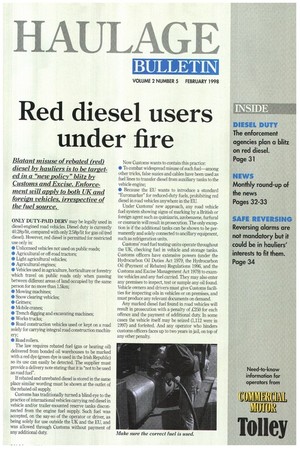HAULAGE
Page 33

If you've noticed an error in this article please click here to report it so we can fix it.
BULLETIN
VOLUME 2 NUMBER 5 FEBRUARY 1998
Red diesel users under fire
Blatant misuse of rebated (red) diesel by hauliers is to be targeted in a "new policy" blitz by Customs and Excise. Enforcement will apply to both UK and foreign vehicles, irrespective of the fuel source.
ONLY DUTY-PAID DERV may be legally used in diesel-engined road vehicles. Diesel duty is currently 40.24/lit, compared with only 2.58p/lit for gas oil (red diesel). However, red diesel is permitted for restricted use only in: • Unlicensed vehicles not used on public roads; • Agricultural or off-road tractors; • Light agricultural vehicles; • Agricultural engines; • Vehicles used in agriculture, horticulture or forestry which travel on public roads only when passing between different areas of land occupied by the same person for no more than 1.5km; • Mowing machines; • Snow clearing vehicles; • Glitters; • Mobile cranes; • Trench digging and excavating machines; • Works trucks; • Road construction vehicles used or kept on a road solely for carrying integral road construction machinery; • Road rollers.
The law requires rebated fuel (gas or heating oil) delivered from bonded oil warehouses to be marked with a red dye (green dye is used in the Irish Republic) so its use can easily be detected. The supplier must provide a delivery note stating that it is "not to be used as road fuel".
If rebated and unrebated diesel is stored in the same place similar wording must be shown at the outlet of the rebated oil supply.
Customs has traditionally turned a blind eye to the practice of international vehicles carrying red diesel in vehicle and/or trailer-mounted reserve tanks disconnected from the engine fuel supply. Such fuel was accepted, on the say-so of the operator or driver, as being solely for use outside the UK and the EU, and was allowed through Customs without payment of any additional duty Now Customs wants to contain this practice; • To combat widespread misuse of such fuel among other tricks, false suzies and cables have been used as fuel lines to transfer diesel from auxiliary tanks to the vehicle engine; • Because the EU wants to introduce a standard "Euromarker" for reduced-duty fuels, prohibiting red diesel in road vehicles anywhere in the EU.
Under Customs' new approach, any road vehicle fuel system showing signs of marking by a British or foreign agent such as quinizarin, azobenzene, furfural or coumarin will result in prosecution. The only exception is if the additional tanks can be shown to be permanently and solely connected to ancillary equipment, such as refrigeration units.
Customs' road fuel testing units operate throughout the UK, checking fuel in vehicle and storage tanks. Customs officers have extensive powers (under the Hydrocarbon Oil Duties Act 1979, the Hydrocarbon Oil (Payment of Rebates) Regulations 1996, and the Customs and Excise Management Act 1979) to examine vehicles and any fuel carried. They may also enter any premises to inspect, test or sample any oil found. Vehicle owners and drivers must give Customs facilities for inspecting oils in vehicles or on premises, and must produce any relevant documents on demand.
Any marked diesel fuel found in road vehicles will result in prosecution with a penalty of £250 for each offence and the payment of additional duty. In some cases the vehicle itself may be seized (1,112 were in 1997) and forfeited. And any operator who hinders customs officers faces up to two years in jail, on top of any other penalty,








































































































